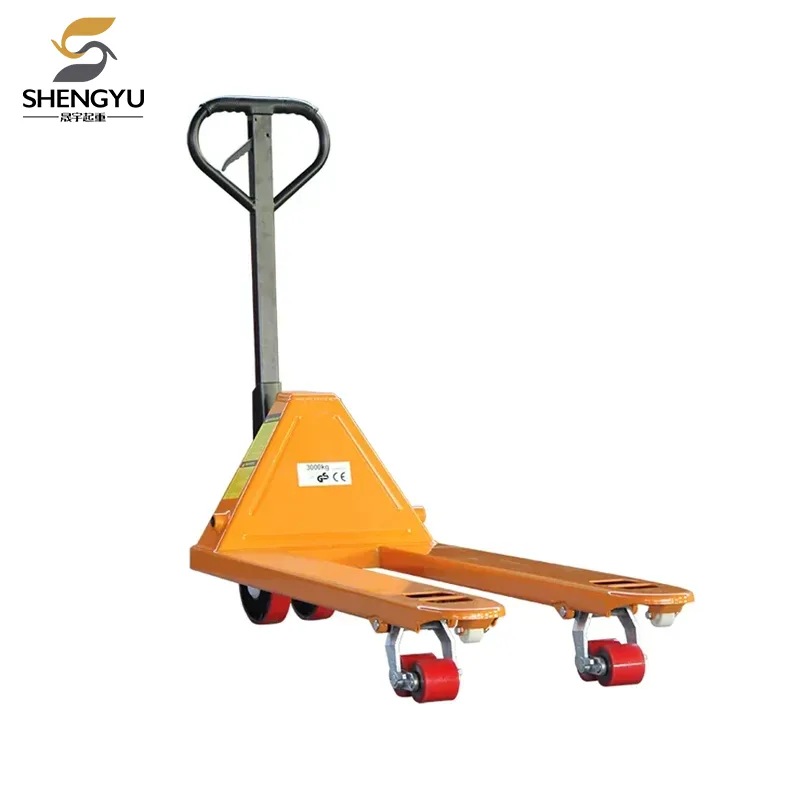Choosing the Right Pallet Truck for Your Business Needs
2024-08-28
Pallet trucks are a vital part of many businesses' operations, helping to move goods efficiently and safely. With a variety of types and features available, selecting the right pallet truck for your specific needs can be a challenging task. In this blog post, we will guide you through the key factors to consider when choosing a pallet truck, ensuring you make an informed decision that enhances your business operations.

Factors to Consider When Choosing a Pallet Truck
1. Load Capacity: One of the most critical factors to consider is the load capacity of the pallet truck. Load capacity refers to the maximum weight the pallet truck can safely lift and transport. It’s essential to choose a pallet truck with a load capacity that meets or exceeds the weight of the pallets you will be moving. Overloading a pallet truck can lead to equipment failure, accidents, and damage to goods.
2. Fork Length and Width: The size of the forks is another important consideration. The fork length should match the size of the pallets you are using. Standard pallet sizes require forks that are long enough to support the load securely. Additionally, the fork width should be compatible with the pallet’s width to ensure stability during transport. Most pallet trucks come with adjustable fork widths to accommodate different pallet sizes.
3. Lift Height: Depending on your operation, you may need a pallet truck with specific lift height capabilities. Standard pallet trucks have a lift height of a few inches, sufficient for moving pallets at ground level. However, if you need to stack pallets or place them on shelves, you may require a high-lift pallet truck or a pallet stacker, which can lift pallets to greater heights.
4. Type of Pallet Truck: As discussed in the previous blog, there are different types of pallet trucks, each suited to specific applications:
- Manual Pallet Trucks: Suitable for smaller operations and lower volumes of goods. They are cost-effective and easy to maintain.
- Electric Pallet Trucks: Ideal for larger warehouses and high-volume operations. They reduce physical effort and increase efficiency.
- Rough Terrain Pallet Trucks: Designed for outdoor use and uneven surfaces. Perfect for construction sites and outdoor storage areas.
- High-Lift Pallet Trucks: Used for stacking pallets and placing them on high shelves. Suitable for warehouses with vertical storage needs.
- Weighing Scale Pallet Trucks: Useful for applications that require accurate weight measurements during transport.
5. Wheel Type and Material: The type of wheels on a pallet truck affects its maneuverability and performance on different surfaces. Common wheel materials include nylon, polyurethane, and rubber. Nylon wheels are durable and suitable for smooth surfaces, while polyurethane wheels offer a balance of durability and noise reduction, making them ideal for indoor use. Rubber wheels provide better traction and shock absorption, suitable for rough or uneven surfaces.
6. Ergonomics and Ease of Use: Consider the ergonomics of the pallet truck, especially if it will be used frequently. Features such as comfortable handles, easy-to-operate controls, and smooth maneuverability can reduce operator fatigue and improve efficiency. Electric pallet trucks with power steering or easy-to-access controls are particularly beneficial for long shifts or heavy usage.
7. Durability and Maintenance: The durability of a pallet truck is crucial, especially in demanding environments. Look for pallet trucks made from high-quality materials, such as steel, with robust construction. Additionally, consider the maintenance requirements of the pallet truck. Regular maintenance is necessary to ensure the longevity and safe operation of the equipment.
8. Budget and Cost-Effectiveness: Finally, consider your budget when choosing a pallet truck. While it’s important to invest in quality equipment, you should also consider the overall cost-effectiveness. Compare the features and capabilities of different pallet trucks within your budget to find the best value for your needs.
Applications of Pallet Trucks in Different Industries
1. Warehousing and Distribution: Pallet trucks are a staple in warehouses, used to move goods efficiently from storage areas to loading docks. They help streamline the picking, packing, and shipping processes, reducing turnaround times and improving productivity.
2. Retail: In retail stores, pallet trucks are used to transport products from stockrooms to the sales floor. They facilitate quick restocking and inventory management, ensuring shelves are always stocked with products.
3. Manufacturing: Pallet trucks are essential in manufacturing plants for moving raw materials, components, and finished products. They help maintain a smooth flow of materials throughout the production process, minimizing delays and downtime.
4. Construction: Rough terrain pallet trucks are commonly used in construction sites to move heavy materials and equipment over uneven surfaces. They are designed to withstand harsh outdoor conditions and provide reliable performance in demanding environments.
5. Food and Beverage: In
the food and beverage industry, pallet trucks are used to transport perishable goods quickly and safely. Electric pallet trucks with speed control and safety features are preferred to handle delicate products.
Conclusion
Choosing the right pallet truck is essential for efficient and safe material handling in various industries. By considering factors such as load capacity, fork size, lift height, wheel type, and ergonomics, you can select a pallet truck that meets the specific needs of your business. Whether you operate a small retail store or a large manufacturing plant, investing in the right pallet truck can improve productivity, reduce operational costs, and enhance workplace safety.


